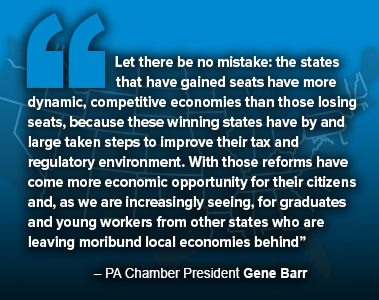The most recent U.S. Census data revealed some unwelcomed, though not surprising news for the Commonwealth – Pennsylvania’s stagnant population growth means that by the 2022 mid-term elections, the state will lose one seat in Congress (going from 18 to 17 seats) and in the Electoral College (going from 20 to 19 votes). This puts our state at a greater disadvantage in presidential elections, reduces our influence on federal issues and further constrains our ability to improve Pennsylvania’s economic outlook.
This isn’t the first time Pennsylvania’s lackluster population growth has diminished its standing in Congress. In fact, since peaking at 36 in 1910, the state has lost U.S. House seats following every census; and our relatively steady population of about 12.7 million residents over the last decade has been outpaced by growth in states including Florida, Colorado, Montana, North Carolina and Oregon (which will gain one seat each in 2022) and Texas (which will gain two). The PA Chamber believes that our state’s slow growth – which includes young people leaving Pennsylvania for more desirable locations after they receive their education and/or training, a phenomenon known as “brain drain” – is due in large part to weak areas of public policy that are leading companies to choose other areas to locate, including undesirable tax rates and a convoluted justice system.
An unfortunate recent example of the impact of Pennsylvania’s anti-business climate on companies’ investment decisions is U.S. Steel’s recent announcement to cancel a $1.5 billion project that would have brought a state-of-the-art improvement to its Mon Valley Works operations in western PA. According to a story in the Associated Press, the decision was made following disenchantment with political gamesmanship, a slow permitting process and ever-changing emissions reduction mandates in Pennsylvania. As Pittsburgh Works Executive Director Jeff Nobers put it, “We had a window of opportunity and it’s absurd that we as a region have allowed that window to be slammed shut.”
 As emphasized in a statement issued by the PA Chamber in response to this disappointing turn of events, the real-world cases of Pennsylvania’s political and economic capital being diminished are all the evidence we need that pro-growth reforms need to be enacted, and fast. As the economy has slowly regained some momentum, many jobs remain unfilled and lawmakers should be laser focused on getting businesses up and running at full capacity and getting people back to work. Policies must also be adopted that address the reasons why companies would choose Florida, Colorado or Texas for investment over Pennsylvania, which include a complicated, uncompetitive Tax Code and a slow and onerous permitting process. The PA Chamber’s efforts to create a better economy and future for all the state’s citizens is at the heart of our “Bringing PA Back” initiative.
As emphasized in a statement issued by the PA Chamber in response to this disappointing turn of events, the real-world cases of Pennsylvania’s political and economic capital being diminished are all the evidence we need that pro-growth reforms need to be enacted, and fast. As the economy has slowly regained some momentum, many jobs remain unfilled and lawmakers should be laser focused on getting businesses up and running at full capacity and getting people back to work. Policies must also be adopted that address the reasons why companies would choose Florida, Colorado or Texas for investment over Pennsylvania, which include a complicated, uncompetitive Tax Code and a slow and onerous permitting process. The PA Chamber’s efforts to create a better economy and future for all the state’s citizens is at the heart of our “Bringing PA Back” initiative.